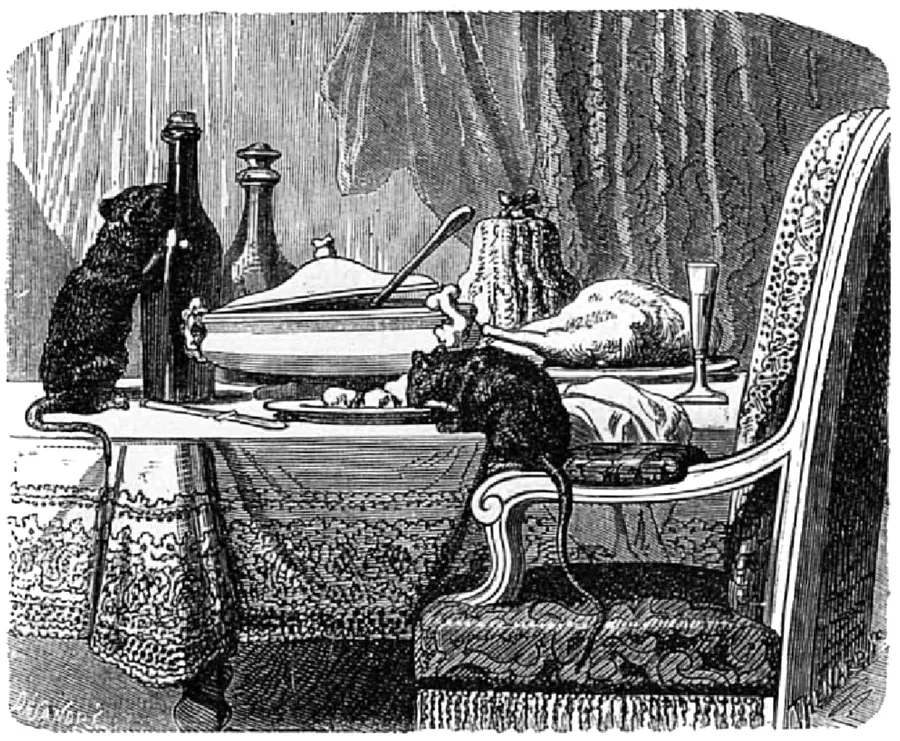The City Rat and the Country Rat
This is another fable that can be applied to crypto and investment in general: do not take too many risks, as you cannot recover from complete ruin.
In the first edition of his Fables, Jean de La Fontaine wrote the life of Aesop, the greek fabulist he borrowed most of his fables stories from. This life is mostly legendary, as La Fontaine says so himself.

Le Rat de Ville et le Rat des Champs
Autrefois le rat de ville
Invita le rat des champs,
D’une façon fort civile,
À des reliefs d’ortolans.
Sur un tapis de Turquie
Le couvert se trouva mis.
Je laisse à penser la vie
Que firent ces deux amis.
Le régal fut fort honnête ;
Rien ne manquait au festin :
Mais quelqu’un troubla la fête
Pendant qu’ils étaient en train.
À la porte de la salle
Ils entendirent du bruit :
Le rat de ville détale ;
Son camarade le suit.
Le bruit cesse, on se retire :
Rats en campagne aussitôt ;
Et le citadin de dire :
Achevons tout notre rôt.
C’est assez, dit le rustique :
Demain vous viendrez chez moi.
Ce n’est pas que je me pique
De tous vos festins de roi :
Mais rien ne vient m’interrompre ;
Je mange tout à loisir.
Adieu donc. Fi du plaisir
Que la crainte peut corrompre !
The City Rat and the Country Rat
Formerly the city rat
Invited the country rat,
In a very civil way,
To scraps of ortolans.
On a carpet from Turkey
The table was set.
I'll let you imagine
What these two friends did.
The treat was very honest;
Nothing was missing from the feast:
But someone disturbed the party
While they were feasting.
At the hall door
They heard a noise:
The city rat scampers;
His comrade follows him.
The noise ceases, so they withdraw:
The rats come back immediately;
And the townsman says:
Let's finish our whole roast.
That's enough, said the rustic:
Tomorrow you will come to my place.
It's not that I don't like
All your royal feasts:
But nothing comes to interrupt me;
I eat everything at leisure.
Farewell then. It's not fun
When fear can corrupt you!
First Fable: The Circada and the Ant
Previous fable: The Wolf and the Dog
Next fable: The Wolf and the Lamb
The Life of Aesop, by Jean de La Fontaine - part 1
We know nothing specific concerning the birth of Homer and Aesop: we hardly know what happened to them. This is surprising since history does not reject things less pleasant and less necessary than this. So many destroyers of nations, so many princes without merit have found people who have taught us even the smallest peculiarities of their lives; and we ignore the most important things about Aesop and Homer, that is, about the two personages who best deserved the following centuries. Homer is not only the father of the gods, but he is also the father of good poets. As for Aesop, it seems to me that he should be numbered among the sages of whom Greece has so much boasted, he who taught true wisdom, and who taught it with much more art than those who give definitions and rules. The lives of these two great men have truly been collected; but most scholars consider them both fabulous, particularly the one that Planudes wrote. As for me, I did not want to engage in this criticism. As Planudes lived in a century when the memory of things that happened to Aesop was not yet extinguished, I believed that he knew by tradition what he left behind. In this belief, I followed him, without taking away from what he said of Aesop anything that seemed to me too childish, or in any way deviated from propriety.
Aesop was a Phrygian, from a town called Amorium. He was born around the fifty-seventh Olympiad, some two hundred years after the founding of Rome. Whether he had cause to thank Nature or to complain of her, we cannot say; for, by endowing him with a very fine mind, she gave birth to him deformed and ugly in appearance, barely having the appearance of a man, to the point of almost entirely refusing him the use of speech. With these faults, if he had not been able to be a slave, he could not fail to become one. For the rest, his soul remained always free and independent of fortune.
